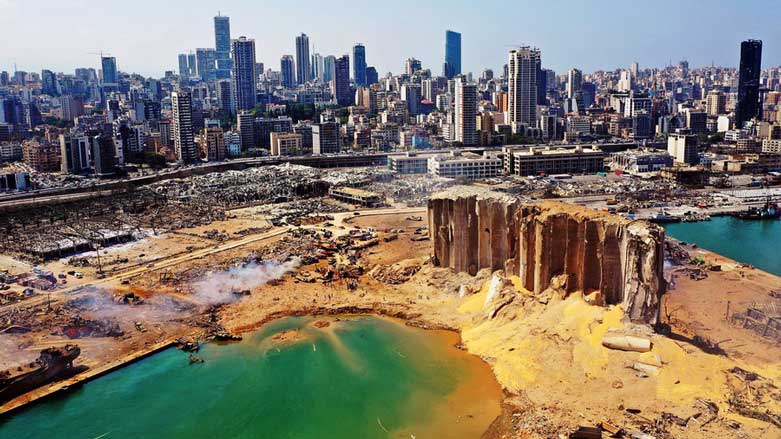Israel, Lebanon agree to maritime border talks—after Beirut port blast

WASHINGTON DC (Kurdistan 24) – On Thursday, it was announced that Lebanon and Israel had reached a “framework agreement” for discussions on delineating the sea boundary between the two countries.
Reaching such an agreement will facilitate exploration for oil and gas in their respective off-shore areas.
The US has long sought to achieve such an agreement, and it appears that Lebanon has finally agreed to the talks, because of the country’s severe economic problems—which were much exacerbated by the August 4 explosion of nearly 3,000 tons of ammonium nitrate, stored under dangerous conditions at the port of Beirut.
Over the past year, the value of the Lebanese lira has dropped by 80 percent, and most of the country gets only two to three hours of electricity a day.
“This historic agreement,” Secretary of State Mike Pompeo said in a written statement on Thursday, “was brokered by the United States and is the result of nearly three years of intense diplomatic engagement by Ambassador David Satterfield,” Acting Assistant Secretary of State for Near Eastern Affairs from September 2017 to June 2019, “and Assistant David Schenker,” who assumed that office in June 2019, after which Satterfield became America’s ambassador in Turkey.
A press conference that Schenker gave on Thursday focused on the new agreement, but in response to a question about Iraq, he said, “The single biggest problem in Iraq is the Iranian-backed militias that are undermining stability there and attacking the United States, and the arms are not under the control of the central government.”
“We can’t tolerate the threat to our people,” Schenker affirmed, “and we will not hesitate to take action, when we deem it necessary to keep our personnel safe,” even as he also noted, “we are working, and we look forward to continuing to work with our Iraqi partners to keep our personnel at our facilities safe.”
Planned Talks between Lebanon and Israel
The talks between Lebanon and Israel are to begin the week of October 12, Schenker told journalists. He will represent the US in the discussions, which will be held in Naqoura, Lebanon, at the headquarters of the UN force that patrols the land border between the two countries (UNIFIL.)
During the George W. Bush administration, Schenker was Levant country director in the Pentagon, the senior policy aide in the Defense Department for Syria, Lebanon, Jordan, Israel, and the Palestinian territories.
Bahrain and the United Arab Emirates signed agreements on normalizing relations with Israel two weeks ago, and Riyadh reinforced those agreements by opening Saudi airspace to Israeli commercial flights.
Read More: Israel signs accords with UAE, Bahrain
However, the influence of Hizbollah—and by extension, of Iran—is extremely strong in Lebanon, and Schenker made clear that the planned Israeli-Lebanese discussions are separate from the agreements on normalization of relations and are intended only to facilitate the exploitation of off-shore energy resources.
“They have nothing to do with the establishment of diplomatic relations,” he affirmed.
Nonetheless, they are “their first negotiations on nonsecurity issues in three decades,” as The New York Times noted, and Schenker added that it is “a positive step that Israel and Lebanon would be talking directly to each other about an important issue.”
The principal negotiator on the Lebanese side has been Nabih Berri, who has been Speaker of Parliament for nearly 30 years—since 1992—and heads the Shi’ite Amal party, which has close ties to Hizbollah.
The principal negotiator on the Israeli side has been Dr. Yuval Steinitz, who has been Minister of Energy since 2015.
From 2013 to 2015, Steinetz was Israel’s Minister of Intelligence and Strategic Affairs.
Editing by John J. Catherine
